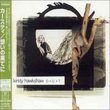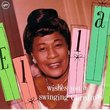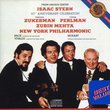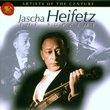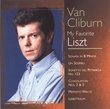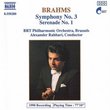| All Artists: Sergey Prokofiev, Neeme Jarvi, Scottish National Orchestra Title: Sergey Prokofiev: Symphony No. 3 in C minor, Op. 44 / Symphony No. 4 in C major, Op. 47 (Original 1930 Version) - Neeme Järvi Members Wishing: 0 Total Copies: 0 Label: Chandos Release Date: 10/28/1992 Genre: Classical Styles: Historical Periods, Modern, 20th, & 21st Century, Symphonies Number of Discs: 1 SwapaCD Credits: 1 UPC: 095115840122 |
Search - Sergey Prokofiev, Neeme Jarvi, Scottish National Orchestra :: Sergey Prokofiev: Symphony No. 3 in C minor, Op. 44 / Symphony No. 4 in C major, Op. 47 (Original 1930 Version) - Neeme Järvi
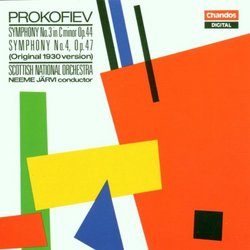 | Sergey Prokofiev, Neeme Jarvi, Scottish National Orchestra Sergey Prokofiev: Symphony No. 3 in C minor, Op. 44 / Symphony No. 4 in C major, Op. 47 (Original 1930 Version) - Neeme Järvi Genre: Classical
That these symphonies are not more famous than they are simply amazes me. Prokofiev understood the nature of symphonic writing, and after the dainty cuteness of Symphony 1, he was ready to make his own mark. The Symphony... more » |
Larger Image |
CD DetailsSynopsis
Amazon.com essential recording That these symphonies are not more famous than they are simply amazes me. Prokofiev understood the nature of symphonic writing, and after the dainty cuteness of Symphony 1, he was ready to make his own mark. The Symphony 3 (1929) begins with a brash sense of alarm, then becomes quieter, more operatic in nature. And the composer's weird clashing harmonies are throughout the piece. Two versions of the Symphony 4 (1940) exist. This is the original version, which is shorter than the latter 1940 version. Neeme Järvi and the SNO have recorded the entire series for Chandos, and these are the ones to have. --Paul Cook. Similar CDsSimilarly Requested CDs
|
CD ReviewsSpectacular John | Winnipeg, Manitoba, Canada | 01/17/2001 (5 out of 5 stars) "Both of the symphonies on this disc are based on material from other works. The 3rd uses material from Prokofiev's opera 'The Fiery Angel' (which is, in my opinion, one of his most outstanding works), and the 4th is constructed of unused material from his ballet 'The Prodigal Son'. If you enjoy either of these works, you will enjoy these symphonies. That being said, if you've never heard the ballet or the opera these are two incredible (and underrated) symphonies that can more than hold their own. Jarvi shows off his true talent for conducting Prokofiev, bringing unsurpassed lyricism to the slow movements, and chaotic, yet clear intensity to the terrifyingly sinister dissonances of the 3rd. The Scottish National Orchestra is an extremely capable partner. The sound is crisp and clear and very loud. If you're a fan of Prokofiev, 20th century music or great symphonies I strongly urge you to purchase this disc." Buy Now R. Williams | Los Angeles, CA United States | 01/24/2002 (5 out of 5 stars) "Seriously, if you have never heard Symphony #3, you must purchase this disk. Stravinsky idolized Tchaikovsky's immense lyricism. When Prokofiev is at his best, the result is a chimera of the two (to me, the piece Le Baiser de la Fee that Stravinsky finished for Tchaikovsky sounds like Prokofiev). Symphony 3 is probably the best example of Prokofiev's immense genius in fusing these disparate elements. The first movement is centered around a dark, hypnotic circular theme that bursts out like an explosion at the start of the piece, fading rapidly into a more assuring subtheme which is quickly dismissed by quivering strings and then a long descent into madness which is capped in an outrageous conclusion to the first movement, followed by one of the most hauntingly beautiful second movements in all music. As was noted elsewhere, Prokofiev poached this music from his opera 'The Fiery Angel' when, after 10 years, he was unable to get it staged. The opera is about a woman who keeps having visions and she can't tell if they are an angel or the devil. The music lives up to this lofty billing, alternately mixing the beatific and the infernal, until it ends in a mad, farcical romp. On the very short list of works you can't live without..." A Personal Reflection to Prokovief's Sym. No.3 Ronald F. Payne | Alexandria, VA United States | 09/23/2001 (5 out of 5 stars) "I ordered this cd shortly before the World Trade Center and Pentagon attacks. I have since listened to the 3rd Symphony over and over. It seems to reflect so much of my own emotional turmoil following these horrific events. The crashing alarm of the openning, the soft quizzical lament of the ensueing theme, the brutal brassy vengeful march, the anxiety of the restlessly scurrying strings, the mystical other-worldly searching that also seems present in the first movement: all this makes this symphony one of the few pieces of music that I turn to in the face of these shattering assaults on peace and normalcy."
|

 Track Listings (8) - Disc #1
Track Listings (8) - Disc #1
